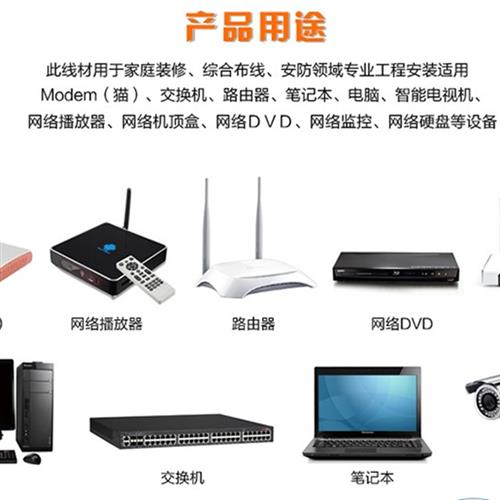了解网线的重要性:为你的网络建设保驾护航!
观想沮
2024-11-09 19:30:55
0次
了解网线的重要性:为你的网络建设保驾护航!
随着科技的发展和互联网的普及,网络已经成为我们日常生活和工作中不可或缺的一部分。而在这个网络世界中,网线作为连接各种设备和网络的桥梁,其重要性不言而喻。本文将深入探讨网线的重要性,并强调其在网络建设中的关键作用。
一、网线的定义与种类
网线,又称以太网电缆,主要用于在局域网(LAN)中传输数据。它以铜线或光纤为核心,外部有绝缘层和保护层,确保信号的稳定传输。根据传输速度、距离和使用的环境,网线可以分为多种类型,如CAT5e、CAT6、CAT7等。
二、网线的重要性
1. 连接设备:网线是连接电脑、路由器、交换机等网络设备的重要媒介。没有网线,这些设备将无法进行数据传输和通信。
2. 保障网络稳定性:优质的网线可以确保信号的稳定传输,减少数据丢失和延迟,从而保障网络的稳定性。
3. 提高工作效率:在企业和办公室等场景中,稳定的网络连接可以提高工作效率,降低因网络问题导致的生产力损失。
4. 网络安全基石:网线作为网络建设的基础设施,其质量和稳定性直接影响网络安全。优质的网线可以减少网络攻击的风险,提高网络安全性能。
三、如何为你的网络建设保驾护航
1. 选择合适的网线:根据实际需求和预算,选择合适的网线类型和规格。确保所选购的网线符合传输速度、距离和环境要求。
2. 规范布线:在布线过程中,应遵循规范的操作流程,确保线缆的整洁、有序和安全。避免因布线不当导致的信号干扰和损失。
3. 定期维护:定期对网线进行检查和维护,及时发现并解决潜在问题。对于老化和损坏的网线,应及时更换,确保网络的稳定运行。
4. 专业支持:寻求专业的网络技术支持和咨询,确保在遇到问题时能够及时得到解决。
四、总结 综上所述,网线在网络建设中的重要性不言而喻。作为连接各种设备和网络的桥梁,网线的质量和稳定性直接关系到网络的性能和安全性。因此,在选择、布线和维护网线时,应遵循规范的操作流程和标准,确保网络的稳定运行。同时,寻求专业的网络技术支持和咨询也是保障网络安全和稳定的关键措施。 英文翻译: Understanding the Importance of Network Cables: Safeguard Your Network Construction! With the development of technology and the popularization of the Internet, the network has become an indispensable part of our daily lives and work. In this network world, network cables, as the bridge connecting various devices and networks, are of great importance. This article will delve into the importance of network cables and emphasize their critical role in network construction. Firstly, the definition and types of network cables.Network cables, also known as Ethernet cables, are mainly used to transmit data within a Local Area Network (LAN). They consist of copper or fiber-optic wires with insulating and protective layers to ensure stable signal transmission. Depending on the transmission speed, distance, and environment, network cables can be divided into various types such as CAT5e, CAT6, CAT7, etc.
Secondly, the importance of network cables. 1. Connecting Devices: Network cables are essential for connecting computers, routers, switches, and other network devices. Without network cables, these devices cannot transmit data and communicate. 2. Ensuring Network Stability: High-quality network cables can ensure stable signal transmission, reduce data loss and delay, and maintain network stability. 3. Improving Work Efficiency: In enterprises and offices, a stable network connection can improve work efficiency and reduce productivity losses caused by network problems. 4. The Cornerstone of Network Security: As the infrastructure of network construction, the quality and stability of network cables directly affect network security. High-quality network cables can reduce the risk of network attacks and improve network security performance. Thirdly, how to safeguard your network construction with network cables. 1. Choose suitable network cables: Select the appropriate type and specification of network cable according to actual needs and budget. Ensure that the selected network cable meets transmission speed, distance, and environmental requirements. 2. Standardize cabling: During cabling, follow standard operating procedures to ensure neatness, orderliness, and safety of the cable. Avoid signal interference and loss caused by improper cabling. 3. Regular maintenance: Regularly inspect and maintain network cables to identify and resolve potential issues in a timely manner. Replace old or damaged cables to ensure stable network operation. 4. Professional support: Seek professional network technical support and consultation to ensure timely resolution of issues when encountered. In conclusion, the importance of network cables in network construction is self-evident. As a bridge connecting various devices and networks, the quality and stability of network cables are相关内容
热门资讯
网线故障排查与修复技巧
本文介绍了网线故障的排查与修复技巧,包括测试网络连接、检查物理连接、使用工具检测等排查方法,以及更换...
网线故障排查与解决方法:让网络...
本文介绍了网线故障排查与解决方法,包括物理检查、连接设备及网络设备状态等方面,针对常见故障如网络不稳...
网线的历史与发展趋势
网线历史悠久,从电话线到光纤,逐渐发展成高速、高带宽的数据传输工具。未来趋势包括高速、高带宽、光纤到...
千兆网络、万兆网络与网线的选择...
摘要:选择适合的网线是确保网络速度和效率的关键,根据网络速度需求选择Cat 5e、Cat 6或Cat...
“解析网线传输速度与距离的关系...
网线传输速度与距离关系受多种因素影响,包括网线类型、信号衰减、干扰和噪声等。较远的传输距离可能导致信...
网线故障排查:网络产品连接不畅...
本文介绍了网线故障排查及网络产品连接不畅的解决方法,包括检查物理连接、测试网线通断、重启网络设备等步...
网线的种类与用途:你了解多少?
本文介绍了网线的种类与用途。包括屏蔽网线、非屏蔽网线、光纤网线和同轴电缆,各有不同应用场景。屏蔽网线...
网线与网络产品的兼容性:如何确...
本文讨论了如何确保网线与网络产品的兼容性及性能。选择合适网线,了解产品兼容性,正确安装连接,配置调试...
网线的长度与速度:你需要知道的...
本文详细介绍了网线长度与速度的关系,指出长度对网络体验的重要性。还提到了如何优化网线长度提高速度,以...
网线连接技巧:如何正确连接两个...
文章摘要:本文介绍了连接两个网络设备的技巧和步骤,包括准备工具和材料、连接步骤及注意事项。需确保网线...



